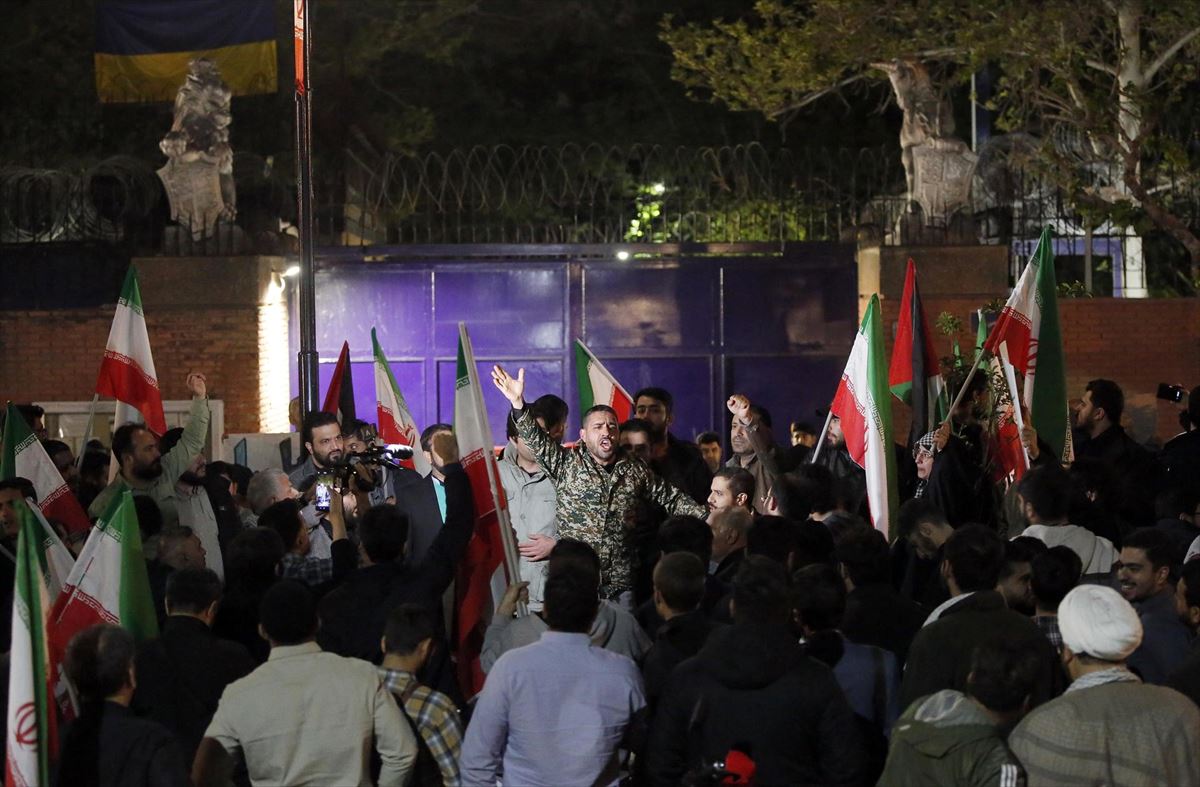Tel Aviv’s military alliance with the US facilitates the shooting down of almost all projectiles, although a base in southern Israel suffers damage. Hezbollah attacked northern Israel at the same time.
Iran had for days promised “punishment” against Israel in response to the April 1 attack on the Iranian consulate in Damascus, and finally made good on its threats late Saturday with an unprecedented massive drone and missile action that sparked unrest. the tension between these two historical enemies to the extreme, opposite poles of a Middle East that has been on alert for months.
Israeli authorities had been preparing for what seemed inevitable for some time, and even before the attack was confirmed, they suspended classes and restricted the right to assemble. Shortly afterwards, the Israeli Defense Forces (IDF) confirmed that the attack had begun, speaking from the start of “dozens” of drones, although the Revolutionary Guard later clarified that they would also include rockets among the projectiles launched.
Israeli army spokesman Daniel Hagari confirmed this is the case in total more than 200 projectilesalthough the majority of them are said to have been intercepted outside Israeli territory.
Hagari reported damage to a military base in southern Israelalthough he has stated that they are not serious.
Israel bombs the Iranian consulate in Damascus, killing two Iranian Revolutionary Guard generals
Iranian officials have placed special emphasis on the impact on these facilities, emphasizing that they served as a base for the bombing of the consulate, although the images most widely circulated in these media were those of the projectiles being fired over some of the areas flew. most emblematic of Jerusalem.
Israel will not stand idly by
Iran’s government has invoked its right to self-defense to justify the action and its delegation to the UN has gone so far as to say that this exchange of attacks can be considered “completed” for them, in a veiled appeal . for Israel to refrain from responding.
However, Israeli Prime Minister Benjamin Netanyahu has already stopped any speculation as soon as the drone and missile launches took place, pointing out, on the one hand, that Israel is “strong” and has “prepared” for the “direct attack” and, on the other hand, that he will not stand idly by.
“I have stated a clear principle: whoever hurts us, we will hurt them. “We are going to defend ourselves against any threat and we will do so calmly and decisively,” warned Netanyahu, who has assembled the war cabinet to study what this response could be.
American defense
Israel’s main international supporter, the United States, has once again come to Israel’s defense, both politically and militarily. US President Joe Biden took action as soon as he heard the news, summoning his top security team to the White House to make clear that support for Israel is “strong” regardless of the discrepancies in recent months.
In fact, North American forces directly participated in shooting down some Iranian projectiles, as Biden himself confirmed after a telephone conversation with Netanyahu.

United Kingdom It also confirmed a mobilization of its teams “in response to the escalation in the region and in cooperation with allies.” British Defense Secretary Grant Shaps has announced the deployment of more military aircraft to the area, ready to “intercept air strikes within the scope of existing missions”, mainly aimed at curbing terrorism in Iraq and Syria.
All this despite the fact that Tehran has issued warning messages against countries that may come to Israel’s aid in these crucial hours, for example by easing its airspace or using its territory to launch some kind of attack on Iran. Iran’s Revolutionary Guards have pointed the finger directly at the United States, a country it called on in a note not to interfere or insist on a “strong” response.
Hezbollahof Lebanon, launched dozens of Katyusha missiles against northern Israel coinciding with the Iranian attack, although it did not link the two events in its statement, collected by the Al Manar network.
Emergency meeting of the UN Security Council
Western leaders such as European Council President Charles Michel, British Prime Minister Rishi Sunak and German Chancellor Olaf Scholz have clearly condemned the Iranian attack and called for general containment. UN Secretary-General António Guterres is “deeply alarmed” by the “very real” risk of a “devastating” increase in tensions across the Middle East and has therefore called for an “immediate halt”. hostilities.
The United Nations Security Council will hold an emergency meeting this Sunday at the request of Israel and, as announced by Biden, the UN leaders G7 They will also hold a meeting seeking a “unified diplomatic response” to the ayatollah regime’s latest challenge.
Source: EITB
I’m Wayne Wickman, a professional journalist and author for Today Times Live. My specialty is covering global news and current events, offering readers a unique perspective on the world’s most pressing issues. I’m passionate about storytelling and helping people stay informed on the goings-on of our planet.



